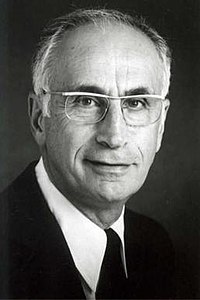Armen A. Alchian | |
|---|---|
 | |
| Born | April 12, 1914 Fresno, California, U.S. |
| Died | February 19, 2013 (aged 98) Los Angeles, California, U.S. |
| Education | Stanford University (BA, PhD) |
| Academic career | |
| Field | Microeconomics Property rights Law and economics[1] |
| Institutions |
|
| School or tradition | New Institutional Economics Chicago School Neoclassical economics |
| Doctoral students | William F. Sharpe,[2] David R. Henderson,[3] Steven N. S. Cheung,[4] Jerry Jordan[5] |
| Influences | Adam Smith,[6] Ludwig von Mises, Friedrich Hayek |
| Awards |
|
Armen Albert Alchian (/ˈɑːltʃiən/; April 12, 1914 – February 19, 2013) was an American economist who made major contributions to microeconomic theory and the theory of the firm. He spent almost his entire career at the University of California, Los Angeles (UCLA), and is credited with turning its economics department into one of the country's best. He is also known as one of the founders of new institutional economics, and widely acknowledged for his work on property rights.
- ^ Marcus, Morton (May 18, 2014). "What 'let us assume' wording leaves out". South Bend Tribune. Archived from the original on 31 August 2021.
His work, along with that of others including, notably, Armen Alchian of UCLA, became the backbone for the merged study of law and economics.
- ^ Wolpert, Stuart (November 5, 1998). "Nobel Laureate William F. Sharpe Awarded UCLA Medal at Ceremony Honoring UCLA Economists". newsroom.ucla.edu. UCLA Newsroom. Archived from the original on 2017-07-25.
Sharpe, who won the Nobel Prize in Economic Sciences in 1990, was a student of Alchian at UCLA and considered him to be a valuable role model as well as his thesis adviser.
- ^ Henderson, David R.; Hooper, Charles L. (2006). Making Great Decisions in Business and Life. Chicago: Park Press. p. 16. ISBN 978-0976854104.
I (DRH) ... learned this as a Ph.D. student of noted UCLA economist Armen Alchian.
- ^ Cheung, Steven N.S. (February 21, 2013). "Eulogy on Armen Alchian by Steven N.S. Cheung". Hong Kong Economic Journal (in Chinese). Translated by Fred K. Luk; Kam-Ming Wan; Chi-Wa Yuen; Michael T. Cheung. Archived from the original on January 11, 2020. Retrieved January 12, 2020. (Archived English version) "My doctoral dissertation, The Theory of Share Tenancy, was written under the co-supervision of Armen Alchian and Jack Hirshleifer."
- ^ "Universal Economics". libertyfund.org. Liberty Fund. Archived from the original on 11 January 2020.
Jerry L. Jordan wrote his doctoral dissertation under the direction of Armen Alchian.
- ^ De Vany, Arthur (July 1996). "Information, Chance, and Evolution: Alchian and the Economics of Self-Organization". Economic Inquiry. 34 (3): 427. doi:10.1111/j.1465-7295.1996.tb01387.x.
Smith and Hayek described it; Alchian gave the evolutionary proof.
- ^ Cite error: The named reference
AER97was invoked but never defined (see the help page).